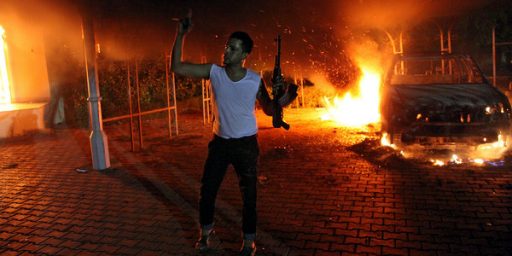WAR OR CRIME?
Phil Carter parses an interesting article in the current Foreign Affairs which argues that the “war on terrorism” is not really a war and that therefore the rules of law enforcement should apply. Phil does an effective job rebutting that argument and the assumptions upon which it rests.
This argument has been going on literally since the day after 9/11 in the United States (indeed, Steven Taylor and I participated in a panel discussion on that very topic within a couple days of the attacks). The extent to which terrorism is ordinary crime or asymmetrical warfare matters, both in terms of the effectiveness of tactics and the rules of engagement that apply. It is particularly tricky when fighting non-state terrorist groups such as al Qaeda, since international wars have traditionally been fought by state actors.
In addition to the points made in Phil’s essay, with which I agree, I would argue that geography matters. The way we need to fight terrorists will be necessarily different depending on the relationship we have with the host country. Thus, going after al Qaeda operatives in Afghanistan required all the tools of war whereas intelligence on the Air France hijacking could be dealt with using the tools of law enforcement. Likewise, we must maintain, to the maximum extent possible, the full range of civil liberties for American citizens accused of terrorist activity on American soil.





My general reaction to Roth’s article was that, like other efforts by HRW since 9/11, he doesn’t want us to fight international terrorism in any effective capacity. One would think from reading Roth that if a Predator drone discovered Osama bin Laden traveling in a caravan in the wilds of Pakistan and we had a chance to shoot him, we shouldn’t do it, even if there’s no way we could send a military team in to capture him. It’s just an infuriatingly stupid point of view driven by moral equivalence and moral blinders.
(My visceral reaction to Roth is driven by the fact that it sounds like he preferred the Clinton administration’s approach to fighting al-Qaeda, which was to dispatch the FBI everywhere. And with regard to Afghanistan, it’s worth noting that before 9/11 Roth supported cutting off arms flows to the Northern Alliance to force them to seek peace with the Taliban, which is just mind-boggling to me.)
Do the math:
Number of troops in Iraq: 130,000.
Number of tropps in Afghanistan/Pakistan: 10,000.
Area of Afghanistan: 251,825 square miles.
Area of Iraq: 171,599 square miles.
Number of Americans killed by Osama bin Laden: 3,000+
Number of Americans killed by Saddam Hussein: About 500, if you include U.S. troops.
Me thinks your thesis is demonstratably false.
(stolen from the Agitator)
Oh, another relevant statistic would be:
Connections to Al Qaeda:
— Iraq: 0
— Afghanistan: multiple
Terrorists:
— Iraq: Some aged Palestinian terrorists
— Afghanistan: can’t count them all
The problem with the “war” metaphor is that it is precisely that. The reason why the definition matters is because “war” has a specific meaning in our constitution.
To co-opt a phrase to gain the powers is something with a terribly long history. We say it’s a “war on crime” but we are very careful to stay within the constitutional boundaries.
Afghanistan was a war, and yes it was part of the prosecution of the crime of terrorism.
It seems perfectly reasonable to keep war defined precisely as it is commonly known, define terrorism as a crime and therefore primarily a law enforcement problem and yet still have wars when we need to.
If you want to use HRW position as a proxy for the vast bulk of democrats, perhaps I should return the favor and use Ann Coulter’s position as a proxy for the vast bulk of republicans.
But I see absolutely no problem with waging the occasional war in the prosecution of something that is primarily a police issue. War isn’t precluded by such a definition of state. The question is whether this is more like a war or more like a police action punctuated by the occasional war.
Saying it’s a new kind of thing doesn’t make it so. There has to be a darn good reason for developing a theory of war that gives extra constitutional powers to the president for decades.
It’s just not a terribly smart idea, if nothing else. And obviously so.
And that’s the problem a lot of us have with the definition as stated by the wonks trying to come up with an excuse for an extra constitutional power grab. It’s an excuse, not a legal or political theory. It is nebulous and fuzzy. It’s simply third grade playground politics.
Precisely the kind of thing that screams “boondoggle” to anyone with brain one.
But I do find it amusing to see the semantic acrobatics used to justify it.
Connections to Al Qaeda:
— Iraq: 0
You just keep right on repeating that to yourself, Hal. Right on through next November.